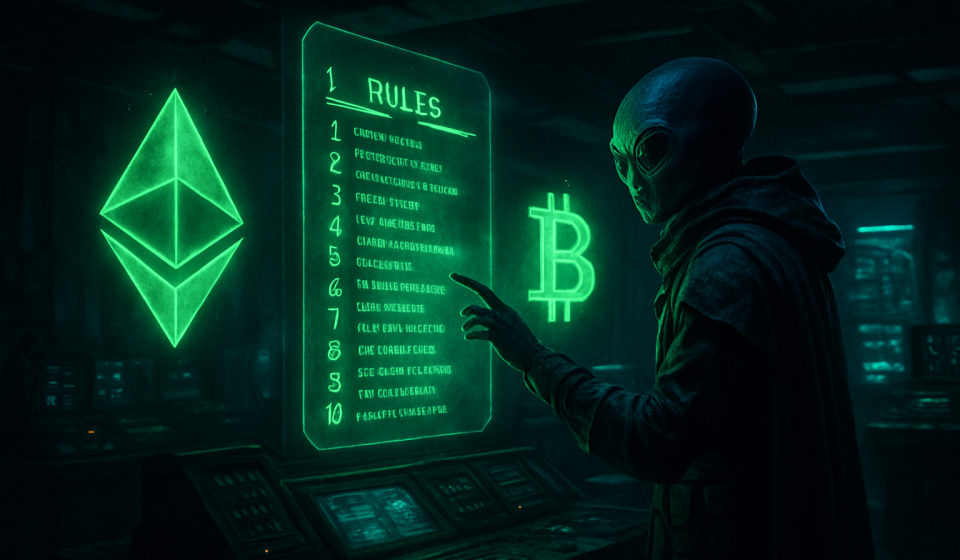
The 10 Laws of Surviving Web3
Table Of Content
- Own the Keys, Own the Kingdom
- Seed Phrases Hate Cameras
- Click Nothing, Type Everything
- Approvals Are Forever (Unless You Revoke)
- Bridges Are Toll Roads to Hackville
- Multisig or It Didn’t Happen
- Devices Have Roles, Not Personalities
- RPC Endpoints Can Lie
- Two-Factor or Two-Seconds-to-Gone
- Practice the Fire Drill
LAW NUMBER 1
Own the Keys, Own the Kingdom
Your hardware wallet is basically a metal-encased debit card that never leaves your hand. If the laptop it’s plugged into gets slime-ware, the worst it can do is ask the card to pay, not pocket the card itself. Treat that thing like it’s the crown jewels: a clean laptop is the armored limo, and you never hand the limo keys to the valet. Keep a spare limo in another garage so one fire doesn’t torch the fleet.
- Plain rule: Store anything over $1 000 on a hardware wallet.
- Pro tip: Plug that wallet only into a crypto-dedicated laptop—most “cold-wallet hacks” begin with a poisoned USB port.
- Advanced OPSEC: Clone the seed to a second hardware wallet and stash it off-site.
LAW NUMBER 2
Seed Phrases Hate Cameras
Those 12 or 24 words? That’s your master password to every dollar you own today and tomorrow. The second you snap a pic, Google Photos politely backs it up to the cloud, OCRs it, and—boom—your secret is searchable to the highest-bidding scumbag. Ink on paper can’t leak through Wi-Fi.
- Plain rule: Write the words on paper—never digital.
- Pro tip: Cloud backups auto-OCR; crooks harvest word-lists nonstop.
- Advanced OPSEC: Split the phrase with 3-of-5 Shamir shards stored in five cities.
LAW NUMBER 3
Click Nothing, Type Everything
Phishing is speed chess: scammers win when you move too fast. By forcing yourself to type the URL, letter by letter, you buy an extra two seconds for your brain to shout, “Hold up, that ‘uniswap-airdrop.pro’ looks sus.” Clicking random Discord links is modern Russian roulette, except the bullet is an infinite-spend token approval.
- Plain rule: Type every dApp or exchange URL yourself.
- Pro tip: Address-poison bots drop look-alike links in Discord; one lazy click drains a wallet.
- Advanced OPSEC: Trade inside a disposable browser-isolation VM that self-destructs on close.
LAW NUMBER 4
Approvals Are Forever (Unless You Revoke)
Whenever you smash that “Approve” button, you’re giving a contract the right to yank tokens from your wallet like an ex with your Venmo login. Old approvals are zombie permissions; they sit quiet until a dev goes rogue or a server gets popped. Schedule a monthly “change the locks” ritual: pour coffee, hit a revoke tool, sleep easy.
- Plain rule: Revoke token approvals monthly.
- Pro tip: 2025’s biggest drains abused approvals left from 2022 mint parties.
- Advanced OPSEC: Install a TX-firewall extension that sim-runs every signature.
LAW NUMBER 5
Bridges Are Toll Roads to Hackville
Cross-chain bridges are like bargain-bin airlines: cheaper tickets, yes, but the plane might fall out of the sky. They pool giant honeypots of collateral and mash together different code bases—perfect storm for mega-hacks. Test with lunch-money amounts first, and if you have to move a bag, break it into a few trips. You’d rather pay three tolls than lose the car.
- Plain rule: Bridge only when you must—test with $10 first.
- Pro tip: Bridges led crypto-loss charts three years straight.
- Advanced OPSEC: Split big transfers into three TXs over time; attackers hunt single fat jumps.
LAW NUMBER 6
Multisig or It Didn’t Happen
Running a shared wallet without a multisig is letting one dude hold everyone’s ATM card. Two-of-three signatures mean no single person (or hacker with their laptop) can nuke the vault. Layer a 24-hour delay on big withdrawals and flash-loan ninjas can’t jack the funds while you’re flying red-eye.
- Plain rule: Pool funds in a 2-of-3 multisig.
- Pro tip: Add a 24-hour timelock so flash-loan coups can’t empty the treasury overnight.
- Advanced OPSEC: Place the guardian signer on another L2/chain for double breach cost.
LAW NUMBER 7
Devices Have Roles, Not Personalities
If you trade, code, Netflix, and download sketchy PDF “whitepapers” on the same machine, you’re hoarding gasoline beside the fireworks. Give each device (or at least each virtual machine) a single job. When malware pops your “fun” laptop, your “money” laptop keeps whistling.
- Plain rule: Segregate hardware—one device for code, one for money, one for life.
- Pro tip: 2025 wallet drains often began with a malware PDF opened on the trading laptop.
- Advanced OPSEC: Adopt QubesOS or strict VMs; even a cheap hardware firewall beats none.
LAW NUMBER 8
RPC Endpoints Can Lie
Your wallet asks an RPC server, “Yo what’s the blockchain say?” If that server’s shady, it can feed you a deepfake ledger: same movie, swapped subtitles. Host your own node or pay a proven provider so the story you sign off on is the one playing in theaters.
- Plain rule: Use reputable or self-hosted RPC endpoints.
- Pro tip: Malicious RPCs silently swap “to” addresses in MetaMask.
- Advanced OPSEC: Run your own light node and point wallets to localhost.
LAW NUMBER 9
Two-Factor or Two-Seconds-to-Gone
SMS 2FA is a paper lock on a steel vault door: looks secure until a SIM-swap bro walks up with scissors. Hardware keys (YubiKey, Solo) are pocket-sized crank handles: no clone, no compromise. Add a withdrawal whitelist so even if someone grabs the handle they still can’t open the vault.
- Plain rule: Secure exchanges with hardware U2F keys, never SMS.
- Pro tip: Underground Telegram ads promise SIM-swap completion in 30 minutes.
- Advanced OPSEC: Enable exchange withdrawal whitelists; a stolen login can’t redirect funds.
LAW NUMBER 10
Practice the Fire Drill
When panic hits, your logic goes on vacation. Pre-writing your “Oh shit, we’re pausing withdrawals” tweet and testing a sweep script turns a nightmare into a checklist: unplug here, run script there, post statement, done. You’ll thank your past self the day something actually catches fire.
- Plain rule: Test yourself. Could you migrate every asset in ten minutes?
- Pro tip: Draft an unpublished “We’ve paused withdrawals…” tweet—own the narrative before the hacker does.
- Advanced OPSEC: Maintain & test an auto-sweep script that migrates all tokens/NFTs quarterly.

